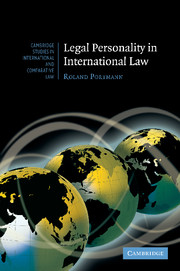Book contents
- Frontmatter
- Contents
- Foreword
- Acknowledgments
- Table of Cases
- List of Abbreviations
- Introduction
- Part I The concept of personality in international law
- 1 Notion
- 2 Conceptions
- 3 Significance
- Part II The conceptions of personality in international law: their origins and legal manifestations
- Part III A framework for personality in international law
- Bibliography
- Index
- Titles in the series
2 - Conceptions
Published online by Cambridge University Press: 05 October 2010
- Frontmatter
- Contents
- Foreword
- Acknowledgments
- Table of Cases
- List of Abbreviations
- Introduction
- Part I The concept of personality in international law
- 1 Notion
- 2 Conceptions
- 3 Significance
- Part II The conceptions of personality in international law: their origins and legal manifestations
- Part III A framework for personality in international law
- Bibliography
- Index
- Titles in the series
Summary
The picture emerges that the concept of personality is present in international law but there are different substantial views on it. Five main positions can be distinguished:
(1) States-only: The first position reserves international personality exclusively to states. There are no conditions for international personality other than having acquired statehood. The corollaries of personality are synonymous with those of being a state. This position is today very rarely, if at all, explicitly advocated. But it is important in historical context and is at times still relevant for legal issues today.
(2) Recognition: The second position conceives of states as the original or primary persons of international law. However, other entities can also acquire international personality, often called derivative or secondary international persons. The mechanism through which this is possible is explicit or implicit recognition by states. Being an international person in principle entails certain fundamental international rights, duties and capacities analogous to those of states.
(3) Individualistic: The third position states a presumption for the individual as an international person in the field of so-called fundamental norms of international law. In addition, states and various other entities can be international persons if there are international norms addressing them. The consequence of personality is international responsibility. Individuals become internationally responsible for violations of fundamental international norms irrespective of whether they act in a public or private function.
(4) Formal: The fourth position declares international law an open system. There is no presumption as to whom is a legal person. International personality becomes an a posteriori concept: every entity is an international person that according to general principles of interpretation is the addressee of the norms of international law. Basically, there are no consequences attached to being an international person.
[…]
- Type
- Chapter
- Information
- Legal Personality in International Law , pp. 13 - 18Publisher: Cambridge University PressPrint publication year: 2010

